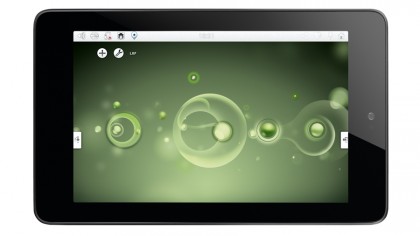Next-gen mobile OSes: what's in store?
A new frontier of Linux-based mobile operating systems
Desktop Linux
A handy alternative.

So far we've been looking at OSes built specifically for mobile devices, but actually there's no reason you can't use a regular version of Linux on a tablet (a mobile phone screen is a bit too small for a normal desktop). Enlightenment is one popular choice that we've been using. Aside from a few niggles, everything works well.
All the familiar applications work, and things go in familiar places. However, it quickly becomes apparent that there's a reason all the major players have developed systems for touchscreens. Hierarchical menus, which are great for mouse-driven user interfaces, feel unnatural and fiddly when used with a touch mechanic. There's the problem that you can't see through your finger to what the pointer is currently on.
Things that do work well on touch, but don't work with a mouse (such as pinch to zoom) aren't generally in these interfaces. Scroll bars are another widget that doesn't translate between touch and mice. Using a regular desktop environment on a tablet is a nice idea that works in practice, just not as well as the alternatives.
While Ubuntu has shown that similar user interfaces can work in various form factors, we remain unconvinced that a single environment can work well on both desktop and portable form factors. Today's hi-def tablet screens, though, do hold enough detail for desktops to work at this size. Though we can't see ourselves switching over to a desktop for our main tablet interface, it could be a useful second interface to use when an external keyboard and mouse are available. Although like Plasma Active, this is probably best left to larger tablets.
The challenge
How mobile Linux OSes can win.
In researching this article we installed four of the six main mobile Linux operating system on a 7-inch tablet. A further one (Firefox OS) is already available on phones commercially. The only one we haven't been able to try on a real device is Sailfish, and plans are well advanced for this to be released soon (possibly even by the time you read this). Together, they represent the work of at least half a dozen companies and plenty of dedicated volunteers.
Get daily insight, inspiration and deals in your inbox
Sign up for breaking news, reviews, opinion, top tech deals, and more.
We were most impressed by the diversity on show. With the exception of CyanogenMod, these aren't simple clones of existing solutions, but real innovations. They offer users a real choice about how they want their mobile devices to work, and allow you to optimise the user experience for your particular uses.
Of course, over a decade of slow growth in desktop Linux usage has shown us that this alone isn't enough to ensure success. The current major players in the market - Google and Apple - are two of the biggest companies on the planet, and neither of them will welcome a new participant, especially if the new participant starts to do well.
In some ways, the mobile marketplace now is a lot like the desktop market place in the early 2000s, at least from an open source operating system perspective. For mobile Linux OSes to succeed, they need to learn from the mistakes of desktop Linux. They need to be available in shops, they need to be backed up by advertising budgets, they need to be seen as cool by the average man in the street, not just by geeks. In short, they don't just need to be better than the existing players, they need to be seen to be better by a large proportion of the market.
It's a tough challenge, but there are some promising signs. Industry rumours are that hardware manufacturers are keen to support nascent OSes to break the duopoly of Apple and Android. Carriers are keen to offer new choice to make them stand out. Couple these with the fact that the average smartphone owner upgrades their device every two years and you have a fast-paced industry that's ripe for change.
As Blackberry can attest, it's a marketplace that can change fast and change hard, but as Microsoft and Nokia have learned, it's also a tough market to break into.
- Now why not read Can Firefox OS be the new Android?